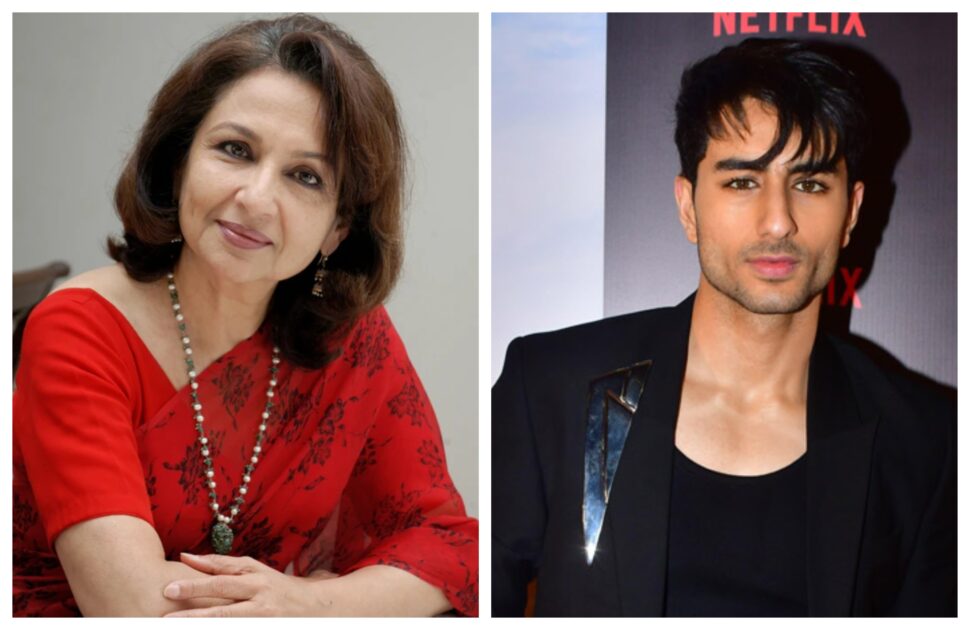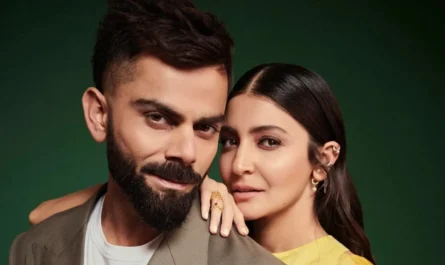On April 15, 2025, Bollywood icon Sharmila Tagore—whose career spans over six decades and includes landmark films in both Hindi and Bengali cinema—offered her unvarnished opinion on her grandson Ibrahim Ali Khan’s much‑anticipated acting debut in the film Nadaaniyan. Directed by Shauna Gautam and co‑starring Khushi Kapoor, the coming‑of‑age drama arrived on an OTT platform to considerable fanfare, not least because it introduced the son of Saif Ali Khan and Amrita Singh into the cinematic arena. Yet while the movie generated buzz, its reception has been decidedly mixed. Here, we delve into what Sharmila Tagore said, explore the film’s broader context, and consider the reactions of other family members and industry insiders.
Setting the Stage: Ibrahim’s Entry into Bollywood
Ibrahim Ali Khan, 22, belongs to one of Bollywood’s most storied dynasties. His grandfather, the late Mansoor Ali Khan Pataudi, was a celebrated cricketer, and his parents—Saif Ali Khan and Amrita Singh—have both enjoyed substantial acting careers. Growing up amid this legacy, Ibrahim’s decision to pursue acting inevitably attracted attention.
When Nadaaniyan was announced last year, the project was pitched as a modern take on youthful ambition, romance, and familial expectations. It pairs Ibrahim opposite Khushi Kapoor, daughter of the late superstar Sridevi and producer Boney Kapoor—another example of next‑generation talent taking center stage. The film’s director, Shauna Gautam, known for her nuanced storytelling in earlier indie works, aimed to balance lighthearted humor with emotional depth.
The Premiere and Early Reactions
Upon its release on April 10, 2025, Nadaaniyan prompted a spectrum of responses. Critics praised the film’s vibrant cinematography and the chemistry between its young leads, yet many pointed to uneven pacing and a script that sometimes relied too heavily on familiar tropes. On the audience front, social media buzz ranged from enthusiastic support for the star kids to skepticism about whether Ibrahim could carry a film on his own merits.
Amid this swirl of commentary, one voice stood out for its combination of personal connection and professional gravitas: Sharmila Tagore’s.
Sharmila Tagore Speaks Out
During a promotional event in Mumbai, the 80‑year‑old actress—who last graced the silver screen in a Bengali production 14 years ago—was asked for her assessment of Nadaaniyan. Tagore, never one to mince words, delivered a balanced but blunt verdict.
“Ibrahim’s film was not good, but he still looks very handsome. He has tried his best,” she said, according to Filmfare. “These things shouldn’t really be said in front of everyone, but honestly, the picture isn’t great. Ultimately, the picture has to be good.” filmfare
Her remarks underscored two things: first, her protective affection as a grandmother; second, her belief that cinematic quality cannot be overshadowed by lineage or looks. In a film industry often accused of nepotism, Tagore’s words remind us that pedigree alone does not guarantee artistic success.
A Legacy of Excellence: Sharmila Tagore’s Own Journey
To appreciate the weight of Tagore’s critique, one must recall her own illustrious career. Discovered in the mid‑1960s, she quickly became a muse for directors like Satyajit Ray—starring in The Home and the World (1984)—and won acclaim in mainstream hits such as Aradhana (1969) and Amar Prem (1972). Tagore’s ability to convey complex emotions with subtlety made her a benchmark for acting excellence.
Her return to Bengali cinema with Puratawn—directed by Suman Ghosh and co‑starring Rituparna Sengupta and Indraneil Sengupta—marked her first screen appearance in that language since Antarmahal (2005). Speaking about that project, she noted her love for Kolkata and Bengali storytelling, while candidly admitting that health considerations had limited her physical readiness for demanding roles. filmfare
Family Reflections: Soha Ali Khan’s Perspective
Not long after Sharmila Tagore’s comments made headlines, Ibrahim’s aunt, actress Soha Ali Khan, weighed in on the film’s tepid reception. In a candid interview, Soha—herself a respected performer and Oxford‑educated author—emphasized the need for resilience in the face of criticism:
“Number one, I think you need to have thick skin when you join this world. One needs to digest people’s opinions or then don’t read the comments. But, I feel, sometimes, it’s important to read the comments because you can’t just work in a vacuum. You have to be receptive to certain criticism, and you have to work on your craft and go forward. The only thing you can do is have some kind of armor.” filmfare
Soha’s advice reflects a broader industry truth: even established stars encounter negative feedback, and the ability to learn from critiques often distinguishes enduring talent from one‑hit wonders.
The Broader Nepotism Debate
The release of Nadaaniyan coincides with an ongoing conversation in Bollywood about nepotism and opportunity. While some argue that family connections open doors unfairly, others contend that sustaining a successful career requires genuine talent and hard work—attributes that the industry and audiences eventually recognize.
Sharmila Tagore’s remarks touch on this debate. By acknowledging Ibrahim’s effort and appearance while critiquing the film’s overall quality, she implicitly affirms that even star kids must deliver substance. Meanwhile, Soha Ali Khan’s comments advocate for openness to critique, regardless of background.
Industry Voices and Critical Consensus
Beyond the Khan family, several critics offered more detailed appraisals of Nadaaniyan.
- The Times of India praised the youthful energy and occasional heartfelt moments but noted the screenplay’s lack of cohesion.
- Rediff commended Khushi Kapoor’s screen presence, suggesting she “outshines her co‑star in key emotional sequences.”
- Bollywood Hungama gave the film a middling rating, observing that while Shauna Gautam’s direction showed promise, the narrative “leans too heavily on formulaic plot devices.”
Such assessments align with Tagore’s overarching point: a film must stand on its own merits, beyond the curiosity factor of debutants.
What Lies Ahead for Ibrahim Ali Khan
Despite the lukewarm reception, Ibrahim Ali Khan’s journey is far from over. Many actors have stumbled early in their careers only to rebound with stronger, more mature performances. Key factors that may shape his trajectory include:
- Choice of Scripts
Opting for roles that challenge him—perhaps in independent films or supporting parts—could help Ibrahim hone his craft away from the glare of expectations. - Acting Workshops and Mentorship
Formal training and guidance from veteran actors (including his grandmother) can provide the technical and emotional tools needed for nuanced performances. - Selective Collaborations
Working with directors known for character‑driven cinema, rather than high‑concept crowd‑pleasers, might showcase Ibrahim’s potential in more meaningful ways.
Should he embrace constructive feedback—whether from critics, family, or peers—Ibrahim could emerge stronger, transforming early setbacks into stepping stones.
Sharmila Tagore’s Continued Influence
While her assessment of Nadaaniyan made headlines, Sharmila Tagore’s influence extends well beyond one film. As a cultural icon, she bridges eras of Indian cinema—from the Golden Age of the 1960s and ’70s to today’s digital revolution. Her willingness to speak truthfully, even about her own family, underscores her integrity and dedication to the art form.
Her recent return to Bengali screens in Puratawn—where she portrays a matriarch navigating familial and societal change—reminds us that great actors evolve with time, finding fresh ways to connect with audiences. Whether on the big screen or via candid interviews, Tagore continues to set a standard for authenticity.
Conclusion: Balancing Legacy and Innovation
The story of Nadaaniyan—and of Ibrahim Ali Khan’s debut—illustrates the complex interplay between lineage and personal merit in Bollywood. Grandmother Sharmila Tagore’s forthright critique serves as a reminder that even the most storied family names cannot guarantee success; ultimately, it is the quality of the work that endures. Meanwhile, Soha Ali Khan’s call for resilience highlights the necessity of perseverance in a fiercely competitive industry.
As Ibrahim charts his path forward, he carries both the weight of a celebrated surname and the opportunity to carve out his own identity. With the guidance of veterans like Sharmila Tagore and the lessons gleaned from Nadaaniyan, he has the foundation to grow into a performer whose name resonates for reasons beyond family ties.
In the ever‑evolving landscape of Indian cinema, this next chapter promises to be as unpredictable as it is exciting—one where tradition and fresh talent intersect, and where the true measure of success lies in the art itself.



